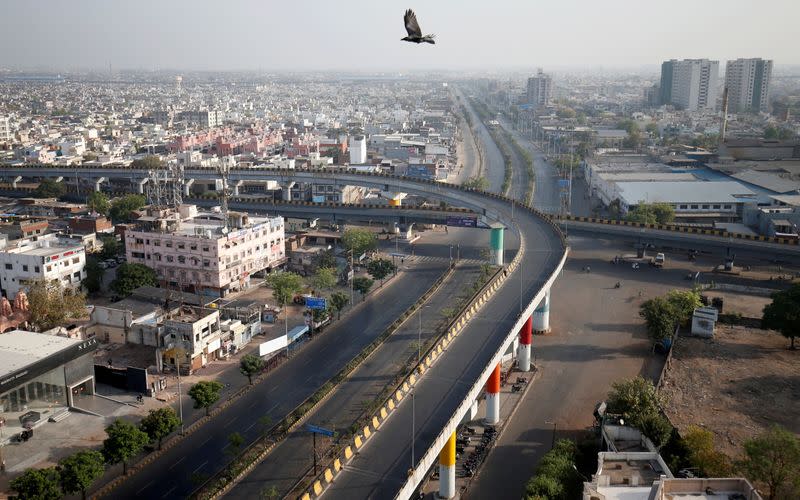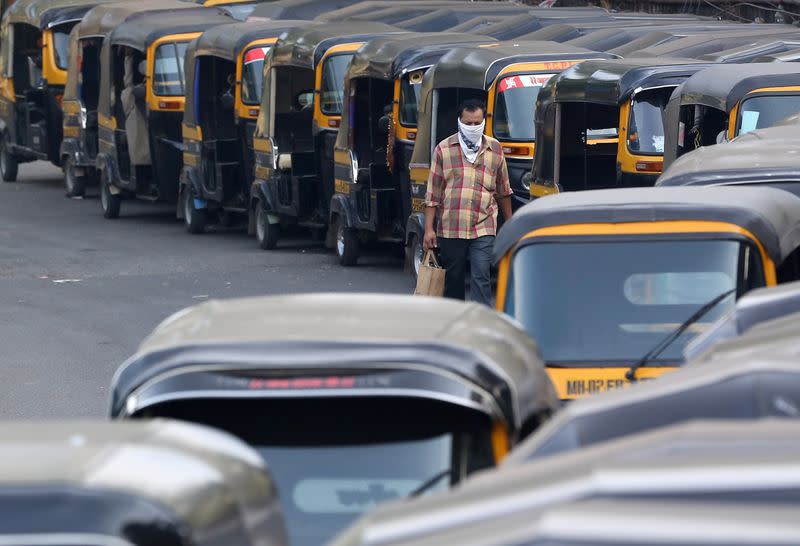Coronavirus curbs in India disrupt supply chains, stoke economy worries
By Manoj Kumar and Jatindra Dash
NEW DELHI/BHUBANESWAR (Reuters) - Restrictions imposed by Indian states to curb a rapid surge in coronavirus cases have disrupted supply chains, hit freight networks and caused labour shortages in the small companies that make up around a third of economic output, business owners said.
India is recording hundreds of thousands of cases daily in its worst phase of the pandemic, forcing authorities in states such as Maharashtra, home to financial capital Mumbai, and New Delhi to take strict steps to control the spread of the virus.
Maharashtra - which contributes 15% to the country's economy - shut most factories from Wednesday, while more than 10 states including Tamil Nadu, Punjab and Haryana have imposed night curfew or weekend curbs which businesses say have already hit transportation and raw material supplies.
But the effects are being felt across the country as small businesses said they been hit by transportation delays as truckers hesitate to travel amid rising cases and curfews.
Small businesses are also worried that as workers may return to their villages as cases rise and job prospects worsen.
In Meerut, an industrial hub about 100 km from New Delhi, Anurag Agarwal, regional head of the Indian Industries Association, said the prices of raw materials for sports goods and other products had risen as supplies have been delayed.
"Night shifts have been cancelled and unforeseen rise in prices of key raw materials have contributed to our woes," said Agarwal, who represents about 10,000 business units.
In southern city of Chennai, K.E.Raghunathan, convenor of the Consortium of Indian Associations, said many small firms were facing an uncertain future as they were now struggling to give delivery commitments to clients as labour shortages were rising due to the curfews.
The hit on small businesses has broader implications for India's economy, Asia's third-largest, and compounds other problems such as the slow pace of vaccinations. India recorded 200,739 new coronavirus infections on Thursday.
The economy had started picking up from January and the government had hoped economy will grow rapidly in the fiscal year that started April 1. Such forecasts are at risk now.
"The pace of GDP growth in the ongoing quarter may be tempered to 20-25% from earlier estimate of 27.5% growth," said Aditi Nayar, chief economist at ICRA, the India arm of Moody's ratings.
TRUCKERS WORRY
Finance Minister Nirmala Sitharaman said this week there would be no national lockdown as it could hit the economy harder. Senior officials told Reuters they are hopeful any adverse economic impact of the surge could be contained quickly.
But Nomura said in a note it expects more states to impose restrictions and the preliminary data for April for freight, passenger traffic and taxes had indicated a dip in activity.
Long-distance road transportation is key to supplies for small businesses across India. The trucking sector is disrupted due to fears among drivers that they may not get basic supplies like food due to strict curfews, said Abhishek Gupta of All India Transporters Welfare Association.
"Drivers are hesitant (to travel) ... Truck rentals are through the roof in some states. It is likely to affect supply to those factories which are functioning," said Gupta.
Manufacturing and mining operations in states such as Odisha and Chhattisgarh have also been affected due to transport issues.
"In Chhattisgarh, iron ore, cement and aluminium industries have cut down production and are operating at minimum level," said Anil Kumar Tuteja, a senior state government official.
(Reporting by Manoj Kumar and Aftab Ahmed in New Delhi, Jatindra Dash in Bhubaneswar, Sumit Khanna in Ahmedabad; Editing by Aditya Kalra; Editing by Alison Williams)

 Yahoo Movies
Yahoo Movies 




